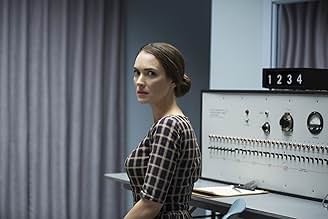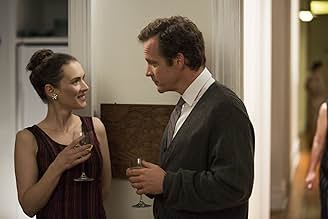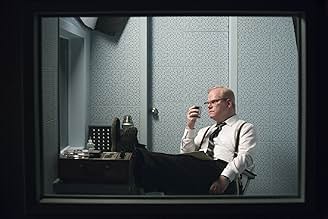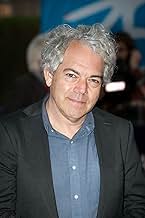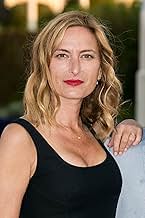En 1961, el famoso psicólogo social Stanley Milgram llevó a cabo una serie de experimentos de comportamiento radical que probaron la disposición de los seres humanos comunes a obedecer a la ... Leer todoEn 1961, el famoso psicólogo social Stanley Milgram llevó a cabo una serie de experimentos de comportamiento radical que probaron la disposición de los seres humanos comunes a obedecer a la autoridad.En 1961, el famoso psicólogo social Stanley Milgram llevó a cabo una serie de experimentos de comportamiento radical que probaron la disposición de los seres humanos comunes a obedecer a la autoridad.
- Premios
- 3 premios ganados y 6 nominaciones en total
- Solomon Asch
- (as Ned Eisenburg)
- Dirección
- Guionista
- Todo el elenco y el equipo
- Producción, taquilla y más en IMDbPro
Opiniones destacadas
The movie depicts to my knowledge accurately the setup, conduction, and results of the experiment and goes further, crafting an interesting and weighted portrayal of the man that Stanley Milgram was. The acting is low key, Peter Sarsgaard especially delivers a down to earth performance which shows that he rigorously prepared for the role. All supporting characters (e.g. Winona Ryder, Anton Yelchin) do a good job and no one distracts from the key issues raised by the experiment.
Cinematography is good, although nothing special. Occasionally there are creative moments in direction. When the 4rth wall is broken by Sarsgaard and he speaks directly to the audience, weird things happen in the background, making these moments very endearing and interesting.
There are no thrills or action in this movie, as well as no conventional drama. It is kind of a biopic with a twist, although I would say the biographic aspect is downplayed by the focus on this specific experiment. Many scientific issues are addressed on a side note (e.g. the ethical code of doing experiments, which triggered the proliferation of ethical committees for scientific research).
I would recommend this movie to people who are interested in science, more specifically in psychology (but not exclusively), that do not need action, drama, or thrills and enjoy a well researched and crafted movie with good acting.
His results caused him both fame and derision and he is still used and cited widely today. The film follows the life of Milgram, his family and marriage and some of his personal acquaintances. Sarsgaard, as ever, is excellent and convincing but there are some filmatic techniques that were a bit odd. There is deliberate use of fake backgrounds - as if it were a play – in some of the scenes. There is also the use of an Indian elephant for two corridor scenes which is left totally unreferenced!?
This could be the elephant in the room has already escaped and is amongst us? I do not know but it is a great centre piece to get you thinking. And that is what this film is really about – challenging and questioning our ideas and ideals about who we are and how we would act if confronted with the self same situations. He called it the 'agentic state' whereby we say 'we were just following orders', or 'it's the law' or worse 'I was told to do it'. I find this sort of discussion fascinating and there is much more here in this film about Milgram's work. One I really enjoyed and feel easy to recommend even with the elephant.
A simple yet effective telling of one of the great breakthroughs in sociology / psychology. Is quite a dry telling, with fairly low production values, but it largely works. Quite interesting, especially as you hear about the results of the main experiment plus some of the other experiments Professor Milgram performed.
As mentioned, it is quite dry though, so can feel a bit dull at times. We don't learn much about Milgram himself, even though much of his life is shown. His family life seems more like padding than anything else (even if his wife is played by the wonderful Winona Ryder).
Solid enough performance by Peter Sarsgaard in the lead role. Good supporting cast. Taryn Manning does look out of place though, playing a 1960s housewife. Maybe it is because I kept thinking of her as Pennsatucky in Orange is the New Black!
**spoiler** Watch it until the end, the message is rather powerful. I specifically liked the ending because (Sasha) Stanley's wife allowed herself to fall in the same class when the nurse made her fill the paperwork while Stanley is having a heart attack. In this instance, I felt like I would have called BS and told the nurse to get a doctor ASAP, instead of calmly filling out the paperwork like she was doing. But then again, that's exactly the message the movie was delivering, that we easily follow orders without question even against what we think is right.
¿Sabías que…?
- TriviaThe real William Shatner did in fact portray Stanley Milgram in The Tenth Level (1976) which was filmed several years after Viaje a las estrellas (1966) ended.
- ErroresThe Coca-Cola cans are from the late 60s into the 70s. Not from 1961, the time of the movie.
- Citas
Stanley Milgram: I believe we are puppets with perception, with awareness. Sometimes we can see the strings. And perhaps our awareness is the first step in our liberation.
- Créditos curiososA cast credit: "Elephant in the Room: Minnie"
- ConexionesFeatures Candid Camera (1960)
- Bandas sonorasSome Enchanted Evening
Written by Richard Rodgers & Oscar Hammerstein II
Performed by Mantovani Orchestra and Chorus (as Mantovani Orchestra)
Courtesy of Drew's Entertainment
Selecciones populares
- How long is Experimenter?Con tecnología de Alexa
Detalles
Taquilla
- Presupuesto
- USD 1,700,000 (estimado)
- Total en EE. UU. y Canadá
- USD 155,575
- Fin de semana de estreno en EE. UU. y Canadá
- USD 8,682
- 18 oct 2015
- Total a nivel mundial
- USD 224,145
- Tiempo de ejecución1 hora 38 minutos
- Color
- Relación de aspecto
- 1.78 : 1
Contribuir a esta página





